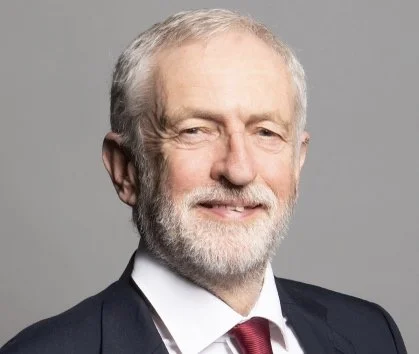Jeremy Corbyn and the "internal resistance"
Sept 14, 2020
Review of Left Out: The Inside Story of Labour Under Corbyn, by Gabriel Pogrund and Patrick Maguire
FOUR YEARS on, it now seems extraordinary that 172 members of Labour leader Jeremy Corbyn’s own parliamentary party launched a coup designed to overthrow him, and that his own deputy Tom Watson was considered “the de facto leader of the internal resistance” to the Corbyn project.
But this is the story told in Left Out, a very even-handed and thorough account of Corbyn’s leadership of the Labour Party and all the insuperable obstacles - internal and external, political and psychological - he was forced to navigate during his tenure.
Almost everyone in Southside, where the Labour Party’s organisational infrastructure was based, were “aggressively and openly opposed” to Corbyn’s leadership, cancelling the security passes of Corbyn’s supporters and secretly funnelling hundreds of thousands of pounds of precious Party funds into the seats of Blairites and other assorted “Corbynsceptics”. “The one thing I didn’t want to hear that morning (of the 2017 election) was Jeremy Corbyn being prime minister,” the authors quote a Southside official as saying.
The divisions were unbridgeable and provided the context in which the antisemitism scandal - with all its bad faith and deliberate mutual misunderstanding - was allowed to fester. People like Angela Rayner said the Party machine was collecting evidence of misconduct against Corbyn sympathisers and no one else. She believed it was part of a covert programme by the “Blairite” establishment, backed up by their friends in the hostile media, to sabotage Corbyn’s leadership.
At the same time, it is extraordinary how close Corbyn came to power in those heady summer months, when Theresa May tottered and stumbled from catastrophe to disaster while firing rounds of high-grade munitions at her own ankles. Grenfell was an astonishing moment, and even felt like a revolutionary one.
Everyone seems to agree that Corbyn’s proximity to power did nothing to change his rebellious, idealistic spirit. He regularly broke free of his security detail. He hated the Westminster bubble. He told close friends he wouldn’t even live in Downing Street if he were elected Prime Minister, and instead “wanted to emulate José Mujica, the Uruguayan partisan who in old age had served as his nation’s president from a ramshackle farm on the outskirts of Montevideo, driving a 1978 Volkswagen Beetle and eschewing a salary and the pomp and privilege of his exalted office.”
And yet, he never seemed in the slightest bit phased by anything. It would have been fascinating to see how he behaved during official summits with the likes of Trump or Bolsonaro.
At the same time, he was driven primarily by his foreign policy positions. As the authors explain:
For Milne, just as for Corbyn, foreign policy was the real locomotive force of his leftism. Both understood their socialism in terms of global power, and who wielded it. In their view, the US was both a global hegemon and a force for ill in the world. They believed its imperialism ought to be resisted, and that resistance to its imperialism could always be justified.
That’s why Team Corbyn were always vulnerable to the charge of being soft on terrorism, extremism and antisemitism. Their enemy was the United States and their enemy’s enemies were the likes of Hamas. They also shared that inexplicable almost-affinity for Russia and Putin that often pops up among the Left: Milne in particular had defended Russia’s annexation of the Crimea as a “limited counterweight” to western hegemony. And Corbyn’s flaccid response to the Salisbury novichok poisonings was quite shameful.
Still, it is the Corbynsceptics who emerge from this story as a pretty rotten lot. Chris Leslie, former SPAD and future chief executive of Britain’s debt collection association, was as reprehensible as they come. “Departing to the back benches after Corbyn’s first victory, he made no secret of his contempt for the leadership or its politics - especially not when journalists were listening. The shock of 2017 had not changed his view either. Despite having predicted a crushing defeat for Labour, Leslie condemned Corbyn for missing ‘an open goal’.”
We also have the former evangelist Gavin Shuker, who wasted no time plotting a massive exodus of MPs from Labour just days after Corbyn had led the party to the brink of victory.
I liked the late David Graeber’s take on all this in the wake of last year’s calamitous defeat: if Corbyn became electable, the entire political rationale of the Blairites - with all their weasily compromises and concessions to tabloid populism - suddenly become a lie.
I look back at that 2017 election, which I watched closely from our home in the remote Shanghai suburbs, and try to remember the hope it kindled. It offered the tantalising possibility that a winning constituency could be built around Corbyn’s radical agenda. In truth, it was a precarious coalition. The people who voted for Labour were split down the middle on the major issue of Brexit, and any move in any direction risked losing votes.
The likes of Chuka Umunna assumed the surge in support in 2017 was because voters were looking for an outlet to chastise May and prevent a hard Brexit. A lot of it probably was, but many other voters in core Old Labour strongholds were already preparing to ditch the party for tilting too far in favour of Remain. In the end, the two sides were irreconcileable, whatever the contours and complexities of Corbyn’s own position on leaving the European Union. The attempt to retain the support of pro-Brexit old mining towns while keeping Remain-supporting metropolitan liberals onside proved to be impossible for Corbyn - and might indeed have been impossible for anyone, Blair included.







